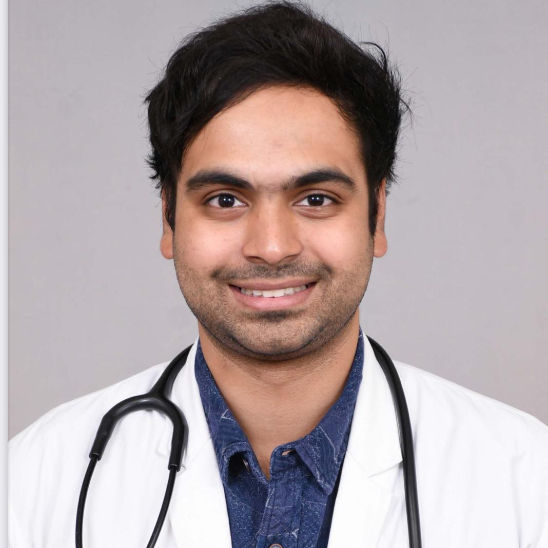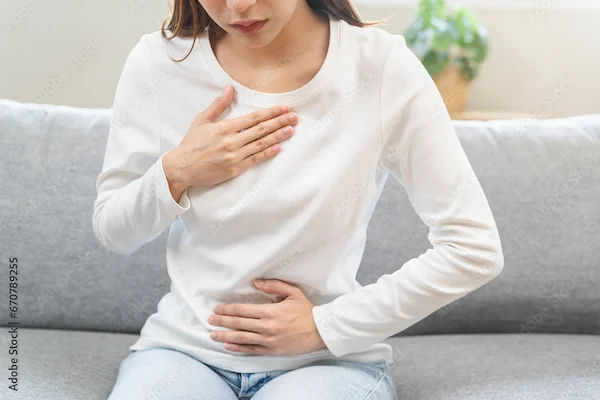Effective Ways to Avoid GERD and Heartburn
Discover effective ways to prevent GERD and heartburn naturally. Learn practical lifestyle changes, dietary tips, and daily habits that can help you reduce symptoms and improve digestion.

Written by Dr. M L Ezhilarasan
Reviewed by Dr. Dhankecha Mayank Dineshbhai MBBS
Last updated on 13th Jan, 2026

Introduction:
That familiar burning sensation in your chest after a meal—heartburn—is more than just an inconvenience; it's often a sign of gastroesophageal reflux disease (GERD). Affecting millions worldwide, GERD occurs when stomach acid frequently flows back into the tube connecting your mouth and stomach. This backwash (acid reflux) can irritate the lining of your esophagus, leading to discomfort and potential complications. But what if you could take control? This guide goes beyond temporary fixes, offering effective ways to avoid GERD by targeting its root causes through smart dietary choices, lifestyle tweaks, and daily habits. Let's explore how you can enjoy your meals without the dreaded burn.
What is GERD, Really?
GERD is a chronic condition where the contents of your stomach consistently reflux into the esophagus. It's not just a one-off episode of indigestion; it's a persistent problem that requires management.
The Mechanics of Acid Reflux
The gateway between your esophagus and stomach is a ring of muscle called the lower esophageal sphincter (LES). Normally, it closes tightly after food passes through. If this sphincter weakens or relaxes abnormally, highly acidic stomach juice can seep back up, causing the burning sensation known as heartburn and other GERD symptoms.
GERD vs. Occasional Heartburn: Knowing the Difference
Everyone experiences heartburn occasionally. It becomes GERD when mild acid reflux occurs about twice a week, or moderate to severe reflux occurs at least once a week. If you're constantly reaching for antacids or your sleep is disrupted by acid reflux, it's likely moved into GERD territory.
Consult a Gastroenterologist for the best advice
Dietary Strategies to Keep GERD at Bay
Your diet is your first and most powerful line of defense. The goal isn't a life of bland food, but one of mindful eating.
Foods to Embrace for a Calmer Stomach
Incorporate non-citrus fruits like melons and bananas, lean proteins like chicken and fish, vegetables like greens and cucumbers, and complex carbs like oatmeal and whole-grain bread. Ginger, with its natural anti-inflammatory properties, is a renowned natural remedy for GERD. Alkaline foods like nuts and fennel can also help neutralise acid.
Common Trigger Foods to Limit or Avoid
Identifying your personal triggers is key, but some foods are notorious for causing problems.
The Acidic Offenders: Tomatoes and Citrus
Tomatoes (and tomato-based sauces) and citrus fruits (oranges, lemons, grapefruits) are highly acidic. This double dose of acid can overwhelm the LES and directly irritate the esophagus.
The Fatty and Fried Culprits
High-fat meals (like fried foods, full-fat dairy, and fatty cuts of meat) relax the LES and delay stomach emptying. This gives acid more time and opportunity to escape upward, a primary cause of chronic heartburn.
Spicy Foods and Other Irritants
Spicy foods containing chili peppers and cayenne can irritate an already inflamed esophagus. Other common irritants include chocolate (which contains methylxanthine, relaxing the LES), caffeine, carbonated beverages, and onions.
Mastering Your Eating Habits
How you eat can be just as important as what you eat.
The Power of Smaller, More Frequent Meals
A large meal distends your stomach, creating upward pressure on the LES and making it more likely to fail. Opting for four to five smaller meals throughout the day instead of three large ones reduces this pressure, making it one of the simplest ways to prevent acid reflux.
Why You Shouldn't Eat Before Bed
Lying down with a full stomach is an open invitation for acid to travel into your esophagus. Gravity can no longer help keep it down. Finish all meals and snacks at least three hours before lying down or going to bed. This allows your stomach to empty significantly.
Lifestyle Modifications for Long-Term Relief
Achieve and Maintain a Healthy Weight
Excess weight, especially around the abdomen, increases pressure on your stomach. This intra-abdominal pressure can force stomach contents through the LES. Studies show that even a modest amount of weight loss can provide significant relief from GERD symptoms.
The Importance of Post-Meal Positioning
Stay upright after eating. Avoid slouching on the couch or bending over. If you need to nap, do so in a recliner. For night-time symptoms, elevate the head of your bed by 6-8 inches using bed risers or a wedge pillow. Propping yourself up with regular pillows is often ineffective.
Quit Smoking and Limit Alcohol
The chemicals in cigarette smoke weaken the LES as you inhale. Similarly, alcohol relaxes the LES and can stimulate acid production. Reducing or eliminating both is a critical step in how to prevent acid reflux long-term.
Wardrobe and Environment Choices That Help
Avoid Tight-Fitting Clothing
Tight belts, shapewear, and skinny jeans can compress your stomach, pushing acid upward. Opt for comfortable, non-constricting clothing, especially during and after meals.
Managing Stress to Soothe Your Gut
While stress doesn't directly cause GERD, it can exacerbate it. High stress may make you more sensitive to the pain of heartburn and can lead to behaviors that trigger it (like poor dietary choices or smoking). Incorporating stress-reduction techniques like walking, meditation, or deep breathing can be a powerful natural remedy for GERD.
Over-the-Counter and Professional Support
When to Consider Antacids and Other Medications
For occasional breakthrough symptoms, over-the-counter antacids (Tums, Rolaids) can neutralise acid quickly. H2 blockers (Pepcid) and proton pump inhibitors (Prilosec OTC) reduce acid production and can be used for short-term management. However, they are not a long-term solution for avoiding GERD and should be used under guidance.
Knowing When It's Time to See a Doctor
If lifestyle changes and OTC medications aren't providing adequate relief, or if you experience alarming symptoms like difficulty swallowing, unintended weight loss, or persistent vomiting, it's crucial to seek professional help. If your condition does not improve after trying these methods for a few weeks, consult a doctor online with Apollo24|7 for further evaluation and a personalised treatment plan. They can provide a proper diagnosis and prescribe stronger medications if needed.
Conclusion
Avoiding GERD is not about a single magic bullet but a sustainable combination of mindful choices. By understanding how your diet, habits, and lifestyle impact the delicate mechanism of your digestive system, you can take proactive control. Start by incorporating one or two changes from this list, such as identifying your trigger foods or adjusting your meal timing. Be patient and consistent; these strategies work cumulatively to strengthen your defenses against acid reflux. Remember, you have the power to significantly reduce your symptoms and reclaim comfort after every meal. However, if you've made these changes and still struggle, it's a sign to partner with a healthcare professional. If symptoms persist beyond two weeks, consult a doctor online with Apollo24|7 to create a targeted strategy for lasting relief.
Consult a Gastroenterologist for the best advice
Consult a Gastroenterologist for the best advice

Dr Piyush Vishwakarma
Gastroenterology/gi Medicine Specialist
11 Years • MBBS, MD, DrNB,
Delhi
Apollo Hospitals Indraprastha, Delhi

Dr. Ankit Vijay Agarwal
Gastroenterology/gi Medicine Specialist
14 Years • MBBS(Osmania), DNB(Internal Medicine ), DM ( Osmania) Consultant Gastroenterologist, Hepatologist and Advanced Therapeutic Endoscopist
Hyderabad
Apollo Hospitals Jubilee Hills, Hyderabad

Dr. Shivaraj Afzalpurkar
Gastroenterology/gi Medicine Specialist
13 Years • MBBS, MD General medicine (Gold medalist), DrNB (Gastroenterology), MNAMS
Bengaluru
Apollo Clinic, JP nagar, Bengaluru

Dr Bhargav Vuppumalla
General Physician/ Internal Medicine Specialist
5 Years • MBBS MD GENERAL MEDICINE
Bengaluru
Apollo Medical Center, Marathahalli, Bengaluru

Dr Sravani Kuppam
General Physician/ Internal Medicine Specialist
12 Years • MBBS DNB General Medicine, CCDM (Diabetes)
Bengaluru
Apollo Medical Center, Marathahalli, Bengaluru
Consult a Gastroenterologist for the best advice

Dr Piyush Vishwakarma
Gastroenterology/gi Medicine Specialist
11 Years • MBBS, MD, DrNB,
Delhi
Apollo Hospitals Indraprastha, Delhi

Dr. Ankit Vijay Agarwal
Gastroenterology/gi Medicine Specialist
14 Years • MBBS(Osmania), DNB(Internal Medicine ), DM ( Osmania) Consultant Gastroenterologist, Hepatologist and Advanced Therapeutic Endoscopist
Hyderabad
Apollo Hospitals Jubilee Hills, Hyderabad

Dr. Shivaraj Afzalpurkar
Gastroenterology/gi Medicine Specialist
13 Years • MBBS, MD General medicine (Gold medalist), DrNB (Gastroenterology), MNAMS
Bengaluru
Apollo Clinic, JP nagar, Bengaluru

Dr Bhargav Vuppumalla
General Physician/ Internal Medicine Specialist
5 Years • MBBS MD GENERAL MEDICINE
Bengaluru
Apollo Medical Center, Marathahalli, Bengaluru

Dr Sravani Kuppam
General Physician/ Internal Medicine Specialist
12 Years • MBBS DNB General Medicine, CCDM (Diabetes)
Bengaluru
Apollo Medical Center, Marathahalli, Bengaluru
More articles from Gerd
Frequently Asked Questions
What is the fastest way to neutralise stomach acid?
Chewing sugar-free gum after a meal can stimulate saliva production, which helps neutralise and wash away acid. Drinking a small glass of water with a teaspoon of baking soda can also neutralise acid quickly, but this should be a rare remedy due to its high sodium content.
Is water good for acid reflux?
Yes, sipping lukewarm water can help dilute stomach acid and flush it back down into the stomach. However, drinking large amounts quickly can distend the stomach and potentially make reflux worse.
What is a good breakfast for someone with GERD?
Oatmeal is an excellent choice as it is filling and absorbent. Other good options include whole-grain toast, bananas, melon, yogurt, and smoothies made with non-citrus fruits and almond milk.
Can GERD be cured permanently?
GERD is a chronic condition, but its symptoms can be managed effectively and often eliminated through consistent lifestyle and dietary changes. In some cases, medical or surgical intervention may provide a long-term solution.
Are probiotics good for GERD?
Emerging research suggests that balancing gut bacteria with probiotics may help improve symptoms for some people by promoting healthy digestion and reducing inflammation, though more evidence is needed.


